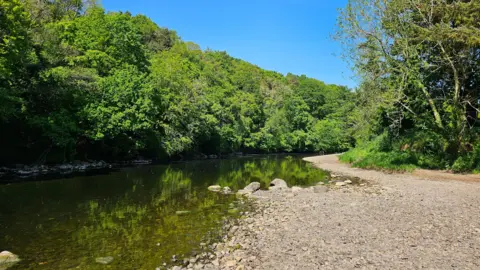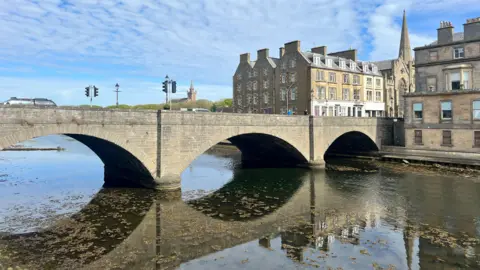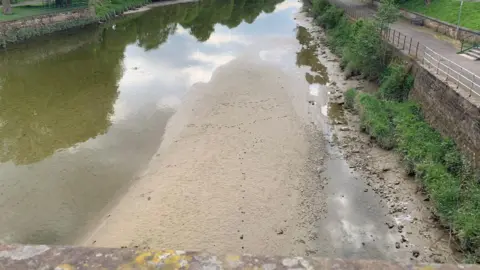Dry spell leaves Scottish rivers on low levels alert
 BBC Weather Watchers/Campbelly
BBC Weather Watchers/CampbellyMore than half of Scotland's rivers have been placed under a low water alert following a long spell of dry weather.
The Scottish Environment Protection Agency (Sepa) said 23 areas surrounding major bodies of water including the Clyde, Dee, Firth of Forth and Firth of Tay were experiencing some level of water scarcity.
Highland Council has urged those on private water supplies to use them responsibly due to lower than normal water levels, while concerns have also been raised over the impact on wild fish.
It comes as the UK as a whole experiences its driest spring conditions so far for 130 years.
Just 80mm of rain has fallen over the entire spring recording period.
Scottish Water said reservoir levels were running at about 81% of capacity – down 10% on the average for this time of year.
Scotland marked its hottest day of the year on Tuesday, with temperatures of 25.5C recorded in South Ayrshire and Stirlingshire.
Sepa began warning of water scarcity at the beginning of March after below-average rainfall last winter followed on from a particularly dry autumn.
Forecasters said it was not likely to rain in Scotland for the next seven days.
Eilidh Johnston, Sepa's senior manager in the water industry and rural economy, said that would lead to drier than normal ground conditions and decreased river flows.
She said: "We have been warning since the start of spring that continued drier weather could disrupt agricultural activities, strain local water supplies and impact industries that depend on consistent water availability.
"Prolonged water scarcity can also impact local ecosystems, lower water quality and place additional pressure on native flora and fauna."
 BBC Weather Watchers/Freddie_Wick
BBC Weather Watchers/Freddie_WickMs Johnston added that those who use water for business or agricultural purposes should "use it wisely" to avoid Sepa imposing restrictions.
She said: "Several industries across Scotland rely on natural water resources, whether it's for food and drink production, hydropower or maintaining world famous golf courses.
"The next few weeks and months are a crucial time of year for water demand and those who take water from our environment must manage it wisely, minimising the need for restrictions to be imposed."
Highland Council said homes with private supplies should check for leaks or contamination risks.
Those include any properties without a Scottish Water mains connection.
The local authority's environmental health team said those homes should boil water before drinking or using it if the supply is untreated.
An emergency scheme to provide bottled water is being set up, they said.
Scottish Water said reservoir levels were down about 3% on last week.
They said they were monitoring water resources across the country.
Fisheries Management Scotland said wild salmon and freshwater fish populations throughout the country could be at increased risk of higher water temperatures and lower dissolved oxygen levels due to the lack of available water.
Chief executive Dr Alan Wells said it created an increased risk of disease and could have an impact on water quality.
He said: "Many of Scotland's rivers are already extremely low, and the implications for our native fish are serious.
"We reiterate the importance of heeding the advice SEPA have provided to those who abstract water for various uses, including crop irrigation."
Dr Rhian Thomas, senior lecturer in freshwater science at the University of Glasgow, told BBC Scotland's Scotcast: "If you take a walk in your village or your town and you see a river, I think people will be noticing really low levels (of water)." she goes onto say
"Things like our Atlantic salmon are very sensitive to the temperature of the water so if we are in a situation where our river temperatures are increasing, then species like salmon and trout will be at risk"
Are we heading for a record dry spring?
With 18 days to go in the spring recording period, Scotland, and the UK as a whole, is on track to break a 132-year record for dry weather.
Just 80mm of rain has fallen this spring, making the 107.2mm that fell in 1893 look like a washout by comparison.
The last time spring was this dry in the UK, Queen Victoria was on the throne.
BBC Scotland weather presenter Kirsteen MacDonald said conditions look to turn more unsettled towards the end of next week, with signs of a move to wetter, Atlantic-driven weather.

Low levels of rain were predicted for parts of central and southern Scotland earlier in the week, but forecasters are now confident the country will not see any rain for the next seven days.
Leuchars in Fife could claim to be the driest place in the UK, the parched ground not seeing a drop of rain for 25 days.
That puts it about 499 years and 340 days away from reaching the record for parts of the Atacama Desert in Chile, the driest nonpolar region on Earth where rain is last thought to have fallen at some point in the 16th century.
It is unlikely Scotland will have to wait quite that long for the deluge to come, however the spring recording period ends on 31 May.
